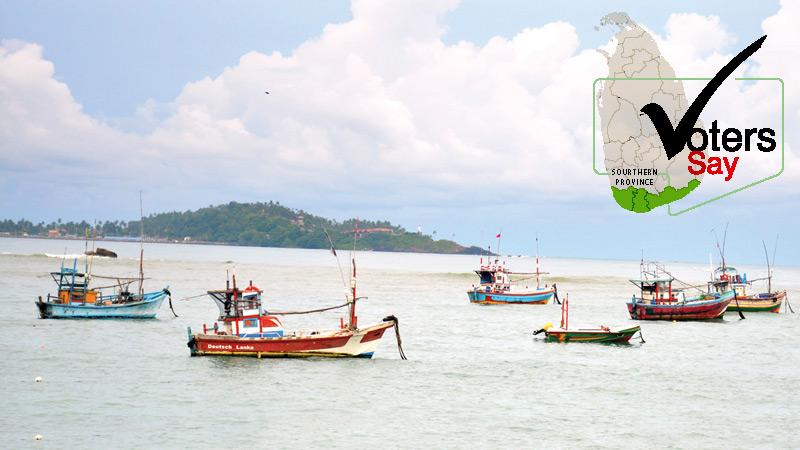
As sons of the Southern soil contest shoulder to shoulder as the main contenders of the upcoming presidential election, the voters of the Southern Province are in a dilemma as to which one would be a better leader. While they discounted efforts of other contestants as foolish endeavours to grab votes from the two “true competitors”, their racial and religious sentiments seemed to play a vital role in the decision of selecting the future president. Fake news, spread through social media and television channels seemed to permeate the perception of many who vehemently condemned the efforts of peace, reconciliation and of a unified nation.
 The three electoral districts, Galle, Matara and Hambantota could be regarded as strongholds of the Sri Lanka Freedom Party (SLFP). It had not swayed from the ‘blue party’ since the third presidential election in 1994 where Chandrika Bandaranaike secured a landslide. The 2015 presidential election saw ex-president MahindaRajapaksa gaining 55.64%, 57.81% and 63.02% of the polled votes from the three districts respectively.
The three electoral districts, Galle, Matara and Hambantota could be regarded as strongholds of the Sri Lanka Freedom Party (SLFP). It had not swayed from the ‘blue party’ since the third presidential election in 1994 where Chandrika Bandaranaike secured a landslide. The 2015 presidential election saw ex-president MahindaRajapaksa gaining 55.64%, 57.81% and 63.02% of the polled votes from the three districts respectively.
However, the opposition-backed common candidate Maithripala Sirisena could secure a win in both Galle and Matara urban councils in 2015.
Meanwhile 2018 local authorities elections had shown a downturn to all major political parties. Rajapaksa camp witnessed a slump up to 50.46% (Galle), 53.48% (Matara) and 49.94% (Hambantota) in the province compared to their mammoth victory in the province in January 2015. An interesting observation is the huge drop of Hambantota votes for Rajapaksa’s from 63.02% to 49.94%.
The populace in these wet and dry zone coastal districts depend mainly on agriculture for a living; growing paddy, tea, cinnamon, pepper, vegetables and fruits. Fisheries and related industries have been a traditional income earner. Tourism, revamped in the region has been enthusiastically latched onto by a citizenry devastated by the tsunami, as the latest addition in a list of trades.
The districts also have their own share of problems. Hambantota, located in the dry zone suffers from scarcity of water both potable and for irrigation. Disregard of environmental concerns in carrying out development projects in the region, illegal settlements and encroachments have intensified the human elephant conflict as well as the risk of flooding. High priced fertiliser, increased cultivation costs and lack of a fixed price for crops encapsulate the majority farming community in a vicious cycle, while the fisheries community clamours for price reductions of fuel and equipment, better prices and markets for their catch and facilities at harbours. Lack of human resources and incentives is fast taking the tea industry downhill, say tea smallholders. Non-employment and under-employment has crippling effects the on household income, they reveal. In addition is the ‘weight’ of the micro finance loans they have taken, a recent issue having a high impact on all three districts.
Change had come to the province in the form of improved access through the Southern highway and the extension of railway lines to Beliatta. However, the province seemed as if it lay in slumber; hardly involved in the presidential race as the Sunday Observer visited town and village. Even in Elpitiya, where the local council election was going on it was business as usual for the townspeople and village folk alike. Roads were mainly devoid of posters, a truly welcome sign from all candidates. However, in town centres and on designated poster boards presidential candidates Anura Kumara Dissanayake and Gotabaya Rajapaksa vied for space with tuition masters.
Overall, the Southern province exhibited a humdrum spirit in welcoming the upcoming elections. With less public engagement in election canvassing, less posters, cut-outs and banners. The province is yet to gain the public’s enthusiasm compared to the last presidential polls.
Galle
It was former president Mahinda Rajapaksa who was the favourite of many residents in Galle. They would vote in gratitude for his assistance and revamping of the tourism industry. His younger brother, the presidential hopeful was viewed both with caution and longing, while the other contender Sajith Premadasa was viewed as one whose vision and effort is thwarted by the rich and the elite.
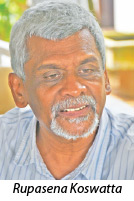 Rupasena Koswatta, a guest house owner in Unawatuna has always been a hardcore SLFP voter. However, he is concerned about the decision of placing Gotabaya Rajapaksa as the candidate from Mahinda Rajapaksa camp.
Rupasena Koswatta, a guest house owner in Unawatuna has always been a hardcore SLFP voter. However, he is concerned about the decision of placing Gotabaya Rajapaksa as the candidate from Mahinda Rajapaksa camp.
“I think Chamal Rajapaksa was a better candidate. Gotabaya has a military mindset and it is questionable how his military principles would fit into the welfare governing system of our country. If Gotabaya wins that is only because Mahinda backs him,” Koswatta said. Akmeemana, Galle is a famous in the province for small tea holdings. T.H. Richard, the President of Meepawala Small Tea Holders Society hopes for a leader who would bring back the glory to the tea industry.
“Ceylon tea is dying now. After Ratnasiri Wickramanayake nobody has served the tea industry properly” Richard laments. In his view, Gotabaya Rajapaksa could easily win the Akmeemana electorate because people still have high respect for late Minister, Richard Pathirana and would support his son (the SLPP organiser) with their vote.
Richard is also of the view that Gotabaya Rajapakse will keep an open door policy if he wins the presidency. “He is such a humble person. We believe that we can speak with his directly to present our problems and get fast solutions,” he said.
Matara
Though surrounding hamlets still looked slothful, Matara town bustled with action as the Sunday Observer team visited. At the centre of the town was displayed a larger than life poster of the former president and his brother, the presidential hopeful. A rally by the NPP the previous day had left many posters of the ‘comrade’ in the surroundings. Buses filled to the brim lined on one side of the road, creating a hive of activity. Men and women dressed mainly in neutral colours boarded the buses peacefully or stood close by chatting with each other. They were getting ready to attend the inaugural rally of candidate Sajith Premadasa, at Galle Face.
However, voters views were mixed towards the two leading contenders, while Sajith Premadasa was viewed as a young educated candidate who is close to people at the grassroots leading by example, Gotabaya Rajapaksa was viewed as a fearless disciplinarian who could take strong decisions.
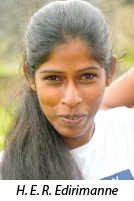 Seventy-year-old Gunapala Palihawadana from Deeyagaha in Matara has a different perspective. The former Ceylon Transport Board employee believes candidate Premadasa will create more employment for the youth and therefore will improve the economy.
Seventy-year-old Gunapala Palihawadana from Deeyagaha in Matara has a different perspective. The former Ceylon Transport Board employee believes candidate Premadasa will create more employment for the youth and therefore will improve the economy.
The 70-year-old is determined to extend his support to his desired candidate and had woken up at 4.00am on Thursday (10) morning to join others from his village to attend Premadasa’s rally at the Galle Face Green in Colombo.
His sentiment resonated with 27-year-old H. E. R. Edirimanne from Hakmana and her friends who were at the Matara Fort. “Premadasa understands the poor man’s struggles. We want a leader who is down to earth and leads by example, not one who lives in the lap of luxury.”
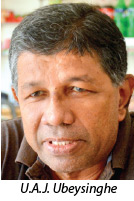
Edirimanne deems that the future president needs pave the way for people to build themselves. She knows that the youth of the country has a lot to offer. “The future president should harness that. We don’t want money. It is opportunities we seek,” she says . “If we are given a way to work hard and make a living, we will do that”.
Colurful boats in large numbers were anchored at the Mirissa harbour, when the Sunday Observer visited. The monsoon season had limited their fishing and whale watching trips. Fishermen were sitting in groups chatting or mending their nets. The harbour has no access to basic facilities such as drinking water and toilets. Lack of infrastructure such as compost pits necessitates refuse from their catch being thrown back into the harbour waters, resulting the whole area being permeated with a bad smell. They want a fearless decision maker who takes strong decisions as the leader of the country. “We will vote for Gota” they yelled in one voice when asked about their views on the upcoming Presidential election.
H.G.S Pradeep Kumara, a fisherman since he was a young adult thinks that military leadership and rules are needed to create a disciplined country. “We need a strict leader. For instance look, everybody is going on strike these days. Can a country run like this?” he questions.
Meanwhile, U.A.J. Ubeysinghe a restaurant owner in Bambarenda, thinks the country’s leader should promote coexistence rather than racial conflict between different communities.
“There are a few Muslim villages in Matara. Those people will never vote for Pohottuwa. They feel insecure about the behaviour of the SLPP. However, according to my analysis, in reality Mahinda Rajapaksa has the chance of winning the coastal area from Hambantota to Gampaha” Ubeysinghe commented.
Hambantota
Though it was noon by the time the Sunday Observer team reached Hambantota, it was a very lethargic town that we saw. The district, according to residents had been ‘neglected’ for decades. However, since 2009, massive development projects had been conducted in the area. Now, they have an international airport, an international port city, an international stadium and an international conference and convention centre. However, the lack of activity be it at the port, the airport or the high rise apartment buildings at the city centre make it more or less a ghost town, where weeds and wilderness is already seen encroaching many development projects.
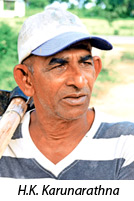 Maroon flags and larger than life banners/bill boards displaying candidate Gotabaya Rajapakse with his elder brother ex-president MahindaRajapakse adorned the surroundings of houses and offices of SLPP organisers along the way with no apparent activity, except in one, where a few vehicles full of people were rushing out of a massive gate. At Weerawila, a police officer and an army soldier were seen at the gates of the residence of candidate Sajith Premadasa, and where a few green flags were flying and a large billboard displayed his work as the Minister of Housing.
Maroon flags and larger than life banners/bill boards displaying candidate Gotabaya Rajapakse with his elder brother ex-president MahindaRajapakse adorned the surroundings of houses and offices of SLPP organisers along the way with no apparent activity, except in one, where a few vehicles full of people were rushing out of a massive gate. At Weerawila, a police officer and an army soldier were seen at the gates of the residence of candidate Sajith Premadasa, and where a few green flags were flying and a large billboard displayed his work as the Minister of Housing.
In the meantime, the Carlton house in Tangalle, the Rajapaksa fortress did not possess any election vibe around. The house area was quite calm while the usual huge banner with illustrations of special occasions of 9-years-long Rajapaksa rule was hanging on the parapet wall.
Though both leading presidential hopefuls are from Hambantota, the elevation of Sinhala Buddhist culture leant the sentiment towards the Rajapaksa family.
Speaking to the Sunday Observer at Weerawila, H.K. Karunarathna, a 62 year old paddy cultivator, said that the preferred candidate having children is a must. “Only if you have your own children can a man have a proper vision for the future,” says Karunarathna. He hopes for education, and employment creation to be prioritised and local agriculture to be supported by the furutre president. Hailing from Welikanda and settling in Weerawila during the early years of the civil war, he prefers the candidate whom he regards as instrumental in ending the war.
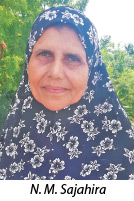 For H. Sriyani, a 41 year old housewife, freedom to live in one’s own country without fear of war or bombings is very important. She would only vote for a candidate who, “thinks of his country, and most importantly stands for this Sinhalese Buddhist nation.”
For H. Sriyani, a 41 year old housewife, freedom to live in one’s own country without fear of war or bombings is very important. She would only vote for a candidate who, “thinks of his country, and most importantly stands for this Sinhalese Buddhist nation.”
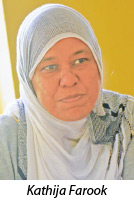
However, Hambantota has a robust Muslim community. The town was named after the Muslim traders who used the port for their business and settled there in ancient times. Kathija Farook, a resident in Siribopura and a beneficiary of the‘ UdaGammana’ program of Minister Sajith Premadasa. Though she is grateful for the opportunities provided through the program, she says that due to weaknesses and failuresof officers around the Minister to address the real needs of people, it had lost its meaning. “There is no transparency as to the criteria of the house or loan recipients. I was sent from pillar to post, in securing a plot for myself. You see, I didn’t have a house of my own,” says Farook.
In Hambantota, almost 50 percent of houses had been given to those who already have their own houses, she claimed. Some had received loans up to Rs. 1200,000 while others only Rs. 400,000. Some are loans while others had been given as grants. The schemes also lack infrastructure such as water, electricity,and most importantly proper roadways. Therefore, “whatever good he (Sajith Premadasa) had done, he is not likely to get a considerable vote from Hambantota” she said.
N. M. Sajahira, a mother of three from Hambantota town had lost her husband during the tsunami. Immediately following the Easter Attacks, Sajahira has found it hard to walk around in the town or board a bus. “Because I wore an abhaya they called me a ‘gonibilla’ or Zaharan. Some Muslim women were asked to get off the bus too,” she said. She hopes the future president would create an environment free from racism.
(Pix: Ranjith Asanka)
